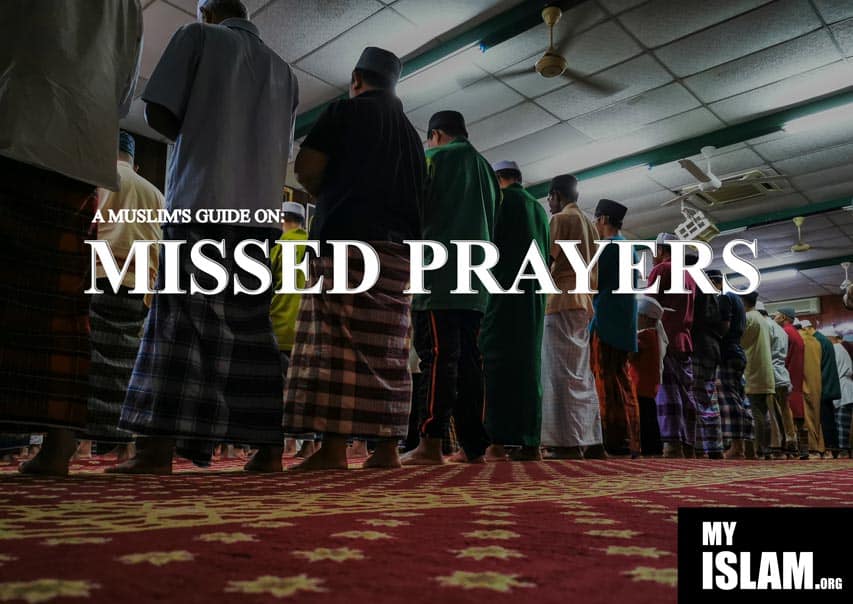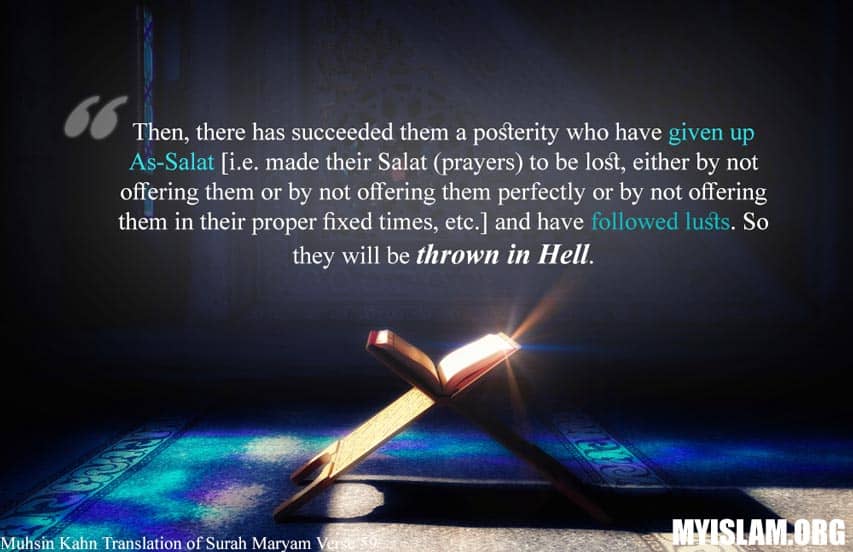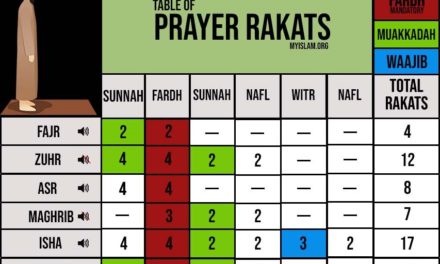
Question: Commonly it asked what the ruling is on missing obligatory or fardh prayers because of laziness or negligence. What is the punishment incurred and what actions must be taken to somehow make up for the missed prayers?
Assalamualaikum,
This topic on missing prayers is one that has many different opinions.
We will explore the different viewpoints and leave the decision up to the reader as to which he believes is the most correct stance. If you struggle with keeping up the prayers, we will discuss later in the article things you can do to motivate yourself to never miss Salah again.
But we must first begin with…
The Importance of Salah According to Quran
To understand why missing Salah is considered a grave sin we must first understand the significance of Salah. It is agreed upon by all scholars that missing the prayer due to work or negligence is not a valid reason and a serious sin, one the believer should not take lightly.
The reason for this is because the prayer was commanded to all followers by Allah in his book and was clearly stated that it should be prayed regularly. The prayer is the second pillar of Islam and a basic tenet to being a Muslim.
“Establish obligatory prayers. Verily, such prayers are enjoined on the believers at stated times” (Surah An Nisa 4:103)
“Verily! I am Allah! La ilaha illa Ana (none has the right to be worshipped but I), so worship Me, and perform As-Salat (Iqamat As-Salat) for My Remembrance.” (Ta-Ha 20:14).
“In Gardens (Paradise) they will ask one another, About Al‑Mujrimoon (polytheists, criminals, disbelievers) (and they will say to them): ‘What has caused you to enter Hell?’ They will say: ‘We were not of those who used to offer the Salah (prayers)’” (Al-Muddaththir 74:38-43)
There are 67 verses in the Qur’an about Salat which are mentioned in another post we had written. These further illustrate the importance or blessings in it.
It is a recent issue where we are collectively being pulled in a hundred different directions, from entertainment, movies, shows, social media Instagram, Tik-Tok, and YouTube but rarely are we being pulled by the media into Islam. It’s not surprising to hear now that some Muslims have lapsed in their prayers and missed a course of few years.
This is a very dangerous position to find oneself in.
As an analogy, let’s say to get into Jannah you need a key. If the key is missing one of its teeth will it be able to open the door? No.
If we wish to reach paradise, we must adhere to the 5 prescribed prayers on a consistent basis, this is the command of Allah and we should not transgress.
Acceptable Reasons for Missing Salah:
In a previous article, 9 conditions for Salah, two of the requirements for prayer are (1) the person must be mature and (2) must be sane.
If the person has not yet reached maturity (puberty) then there is no Taklif (accountability). They would be absolved from missing salah.
Similarly, a person has to be sane, meaning of sound mind or conscious. If the person is in a coma and unconscious for an extended period, then he is forgiven. If a person has slept through prayer, since he was unconscious, he is forgiven but once he wakes up he should immediately offer the prayer. [1] Extreme emergencies where one is not able to leave their task, like a surgeon in the operating room.
Women are excused from prayer altogether during there menstruation cycle. [2]
Another case is when one is has fallen ill and is not able to make the gestures or movements of prayer.
There is mention in a popular hadith, I am sure you have heard of it before, if you cannot pray standing up then sit, if you can’t praying sitting then pray lying on your side. [3]
Punishment and consequences For Missing Salah According to Quran:
No man will be able to determine what will happen on the day of judgement. That decision is left for Allah alone, but from the Quran and Hadith we can see the warnings that were sent by Allah and by the Prophet. We must try our best to avoid these shortcomings, you don’t want to find out the day of reckoning that we were wrong because by then it’ll be too late.
“Then, there has succeeded them a posterity who have given up As-Salat (the prayers) [i.e. made their Salat (prayers) to be lost, either by not offering them or by not offering them perfectly or by not offering them in their proper fixed times, etc.] and have followed lusts. So they will be thrown in Hell.”
Surah Maryam Verse 59
The people discussed in the ayah seem to have totally discarded salah, or they had become completely carless in its observance. Here remains no connection between the person and Allah and we shouldn’t be surprised to hear that the inevitable result of this is Jahannam.
The following ayah in the surah then says,
“Except those who repent and believe (in the Oneness of Allah and His Messenger Muhammad SAW), and work righteousness. Such will enter Paradise and they will not be wronged in aught.”
In Surah Al-Munafiqun ayah 9,
“O you who believe! let your possessions and your offspring not make you negligent of Allah’s remembrance. For whoso does that, they will be the losers.”
Here Allah address all Muslims saying ya ayyuhallazina amanu “O, you who have believe” meaning both the sincere believers and the hypocrites who only profess their faith with their tongues. He advises them, that among all the things which vie for your attention do not forget to worship Allah. Heedlessness in the respect of remembrance of Allah is the cause of many evils.
This is how important the Salah is, the thing which men and women love the most is their children. Allah is teaching us that the remembrance of Allah will be better for them than their children or any worldly possession. So do not let your love for your children lead to negligence. For if you do, you will have lost.
From the Hadith and Opinions of Imams:
Narrated by Imam Muslim in his Sahih hadith, the difference between a man and shirk (idolatry) and Kufr (unbelief) is abandoning the prayer. [4,5,6]
Imam Hambal – One who abandons the salat is kafir (disbeliever).
Sheikh Abdul Aziz Ibn Baz and Sheikh abdul qadir jilani had a similar stance and believed that anybody who is accountable and dies when he is not praying, is a disbeliever; he should not be washed, the funeral prayer should not be offered for him and he should not be buried in the Muslim cemetery.
Regarding the three above, it’s referring to the people who have abandoned the prayer deliberately and purposefully.
Should you make up the missed prayers:
There are two views regarding the prayers which have been missed. The first being they should be made up and the second being they can not be made up, offering afterwards will not be valid.
(1) Imam Abu Hanifah, Imam Malik and Imam Ahmad are of the view that it is obligatory to pray if you missed the fardh prayers in order when making them up. This is on a day to day basis, if you miss Fajr and Zuhr these must be prayed before offering the regular Asr prayer.
The Prophet said, “If any one forgets a prayer or oversleeps, he should observe it when he remembers it; there is no expiation” [7,8]
Salat Repayment Plan
If you have missed consecutive days, months or even years of salat then they do not have to be offered in order. According to Hanafis, Malikis, and Shafi’i one should try to calculate how many prayers have been missed and offer Qadha Salat (qaza salah).
I like to call this a “salat repayment plan” and schedule in the missed prayers just as you would for monthly installments for a phone or a car. Here’s the calculation, missing the previous full year of Fajr prayers can be made up in just four months if you prayed 3 Qadha Fajr Salat daily with your regular salat. When you do the math and spread out the missed salah over time it does not seem impossible. But if try to think of offering all 365 prayers in a day or even a week it will be overwhelming and discourage many from even trying.
Don’t underestimate the power of consistent daily action sustained for a long period of time.
In a single year if you offer 3 qadha salats with your regular prayer you make amends for the past three years of ‘unpaid’ prayers. In three years and three months, you can repay the past decade.
Conditions for Qadha Salat Hanafi View:
- If a person misses Salat for a valid reason, he should only pray Fardh and Wajib Salat. There is no Sunnah or Nafl, except for Fajr sunnah.
- There is no prescribed time for Qadha Salat but one should offer as early as possible.
- If Qadha Fajr Salat is offered before decline of the Sun one should pray both Fardh and Sunnah. If it’s after the sun has set, only offer two rakat of fardh salat.
- If a person has only missed 5 consecutive salats, these should be made up before the regular salat.
- If a person has sustained a longer period of missed prayers, he should try to calculate them and offer them. It’s like a debt which needs to be repaid.
- If a person became sick or too ill to pray, he is granted leniency and does not have to pray. It is, however, still recommended that he offer the missed salats.
- Salat missed during travel should be offered as Qasr salat even once a person has returned home.
- There are no prayers that can be made up in the event Eid prayer or Jummah Prayer is missed. If Jummah is missed, Zuhr should be substituted in it’s place.
Forbidden to pray at the following times:
There are only two times where the Prophet forbade praying salah: [4]
1. When the sun is rising
2. When the Sun is setting
The second view regarding missed prayers.
The view of Shafiʻis is one of mercy. It is recommended to make up for missed prayers but not an obligation as the other schools see it.
Allah has specified the beginning and end for each fardh prayer. Just as it’s not valid to pray before that time, it is not valid to make up for it afterwards. Ibn Hazm and others who agreed with him believe that if prayer is missed without valid excuse it will not be accepted because Allah directly stated,
“Verily, As Salah (the prayer) is enjoined on the believers at fixed hours”
An-Nisa 4:103
Ibn Hazm argued because of this a missed prayer can never be made up. If this is the case, he should repent and ask for the Mercy of his Lord and increase his good deeds and voluntary prayers as to make the scale tip in his favor on the day of judgement.
Sheikh Ibn Taymiyyah said:
The scholars who say that he should make up the prayer do not say that by making it up he is absolved of sin, rather they say that by making it up his burden of sin is reduced, but the sin of missing and delaying the prayer beyond its prescribed time is like any other sin, it needs either repentance or good deeds that will erase it or other things that will waive the punishment. End quote. Minhaj Al-Sunnah (5/233).
How to Motivate Yourself to Never Miss Another Salah:
If you find yourself struggling to make Salah or seem to be lacking motivation the solution may be in learning and crafting a new perspective about it.
We all want to be successful in this life and the hereafter and this comes down to one-word… discipline.
The person who has discipline is strong, and lucky for you and me discipline is something we can work on and improve. Contrarily, you may believe that the person with a 400-pound deadlift is strong. No… the person who can lift his prayer mat at the time of Fajr has true strength.
This is how we get better; we do not neglect the smallest of discipline. Every let down will affect the rest.
If you truly try to please Allah but still find yourself falling short this can be discouraging. But one thing you can not do is beat yourself over the head about this. You should feel sorry and repent, Allah knows what lies in your heart, but you can’t dwell on this for too long or quit praying altogether. The only correct way to respond to the situation is to keep giving your best effort.
We may need to change our view on salah, we should not view it as a task, chore or responsibility. If we have negative connotations, then repeating the act is unlikely to be sustainable. We may pray for a month or two out of sheer will power but eventually this habit will falter. We need to work at constructing a new relationship with our Salah.
If instead of rushing through salah we seek to understand the meaning of the words we are saying and read with patience we can ensure a higher quality of salah. Taking deep breaths while praying, learning and reciting our favorite surahs, anything to make the Salah peaceful and enjoyable. Realize every time you pray salah you are going through a purification process which is absolving you of your sins. [10,11,12]
Realize that each time you pray you stand in front of Allah. Be worthy, feel strong and confident and present yourself proudly. Clear your mind when you are praying, forget all the problems of this life and be present in that moment. That is much better for you.
Conclusion:
Inshallah this article will have provided some new thoughts and perspectives regarding your Salat which were unknown.
In summary, majority of the scholars hold the view that it is obligatory to make up for the missed prayers. This is a prudent approach and if you can make up for all the prayers that is something good.
I am interested to hear your opinion regarding the missed prayer? Please share your thoughts below.
Allah knows best.
References:
[1] Abu Qatadah narrated: “They asked the Prophet about when they sIept past the Salat. He said: ‘There is no negligence in sleep, negligence is only while one is awake. So when one of you forgets a Salat, or sleeps through it, then let him pray it when he remembers it.'” Grade: Sahih (Darussalam) Reference: Jami` At-Tirmidhi
[2] Muhammad b. ‘Uthman asked al-Qasim b. Muhammad about the woman who has a prolonged flow of blood. He replied: She should abandon prayer during her menstrual period, then wash and pray; then she should wash during her menstrual period. Grade: Sahih (Al-Albani) Sunan Abi Dawud
[3] Narrated Imran bin Husain: had piles, so I asked the Prophet (ﷺ) about the prayer. He said, “Pray while standing and if you can’t, pray while sitting and if you cannot do even that, then pray Lying on your side.” Sahih al-Bukhari
[4] ‘Abdullah bin Buraidah narrated that his father said: “The Messenger of Allah (ﷺ) said: ‘The covenant that distinguishes between us and them is prayer; so whoever leaves it, he has committed Kufr.’” Sunan Ibn Majah Grade: Sahih (Darussalam)
[5] same hadith in 4 repeated in Sunan An Nasa’i
[6] Narrated Abdullah bin Buraidah narrated from his father: that the Messenger of Allah (ﷺ) said: “The covenant between us and them is the Salat, so whoever abandons it he has committed disbelief.” Grade: Sahih (Darussalam) Jami At-Tirmidhi
[7] Anas b. Malik reported the Prophet (ﷺ) as saying: If any one forgets a prayer or oversleeps, he should observe it when he remembers it; there is no expiation for it except that. Sunan Abu Dawud Grade: Sahih (Al-Albani)
[8] Narrated Anas: The Prophet (ﷺ) said, “If anyone forgets a prayer he should pray that prayer when he remembers it. There is no expiation except to pray the same.” Then he recited: “Establish prayer for My (i.e. Allah’s) remembrance.” Sahih Bukhari
[9] Ibn Umar never offered the Duha prayer except on two occasions: (1) Whenever he reached Mecca; and he always used to reach Mecca in the forenoon. He would perform Tawaf round the Ka`ba and then offer two rak`at at the rear of Maqam Ibrahim. (2) Whenever he visited Quba, for he used to visit it every Saturday. When he entered the Mosque, he disliked to leave it without offering a prayer. Ibn `Umar narrated that Allah’s Messenger (ﷺ) used to visit the Mosque of Quba (sometime) walking and (sometime) riding. And he (i.e. Ibn `Umar) used to say, “I do only what my companions used to do and I don’t forbid anybody to pray at any time during the day or night except that one should not intend to pray at sunrise or sunset.” Sahih Al-Bukhari
[10] There is no one who offers the five (daily) prayers, fasts Ramadan, pays Zakah and avoid the seven major sins, but the gates of Paradise will be opened to him, and it will be said to him: Enter in peace.”‘ Grade: Hasan (Darussalam) Sunan an-Nasa’i
[11] In the hadith narrated of the authority of Abd Huraira the Messenger of Allah (ﷺ) is reported to have said. while in the hadith narrated by Bakr (the words are like this): He heard the Messenger of Allah (ﷺ) as saying: just see, can anything of his filthiness remain (on the body of) any one of you if there were a river at his door in which he washed himself five times daily? They, said: Nothing of his filthiness will remain (on his body). He said: That is like the five prayers by which Allah obliterates sins. Sahih Muslim
[12] Abu Huraira reported that the Messenger of Allah (ﷺ) said: The five (daily) prayers and one Friday prayer to (the next) Friday prayer are expiations (for the sins committed in the intervals) between them. Sahih Muslim







Assalamualaikum very good article .
I didn’t know the hadith no because there is a hadith on the day of judgement on namaz counting . If your fardh namaz is missing then your nawafil turns into farsh namaz to complete your missing namaz. Put this hadith on your article
Alhamdulillah. This helps a lot. jazak Allahu khayr
This is really helpful. May Allah increase in knowledge.
Alhamduillah! Thanks for the article.
Masha Allah,I am a Muslim who missed salary purposely because of negligence and laziness but this article has told me what to do
Mash’a Alllah I would ensure I repay all my salat insha Allah